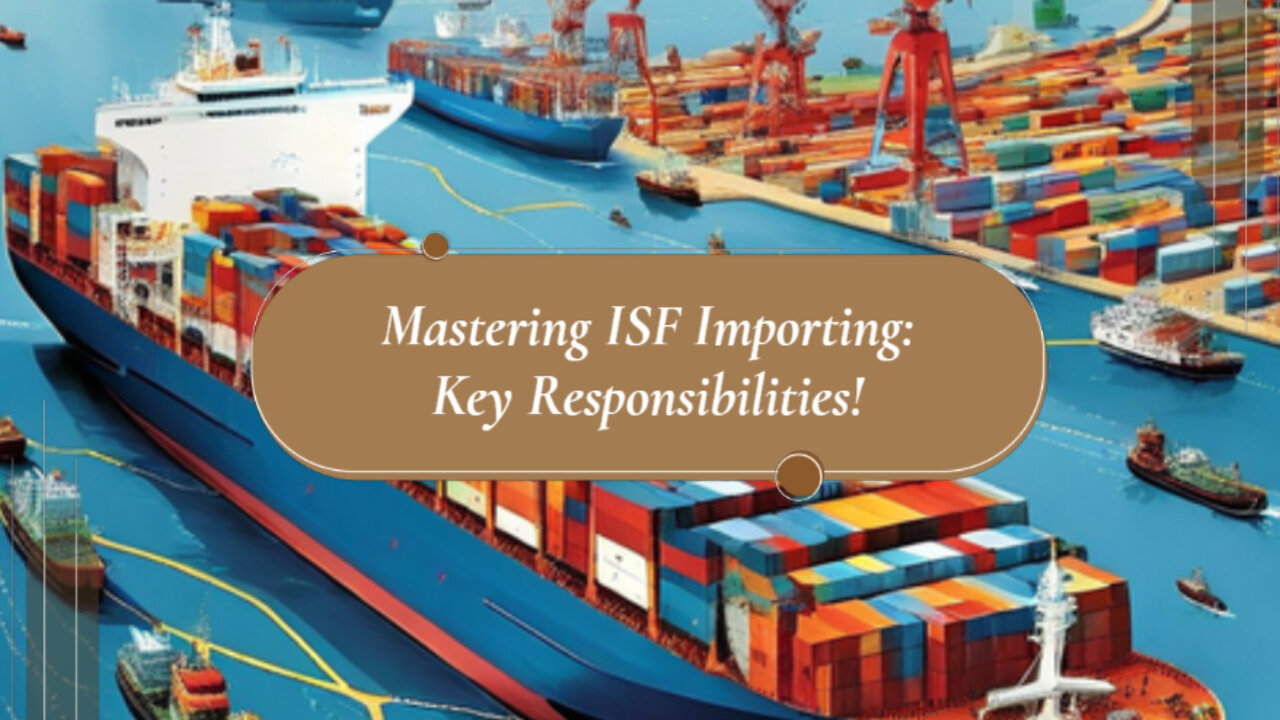Premium Only Content

Mastering ISF: The Crucial Responsibilities of Importers
ISF Checklist || 805-970-7918 || contact@isfchecklist.com || www.isfchecklist.com
In today's video, we delved into the essential responsibilities of ISF importers and provided a comprehensive overview of the Importer Security Filing (ISF) requirements. As an ISF importer, it is crucial to understand your obligations to ensure a smooth and compliant import process.
The first responsibility of an ISF importer is to file the ISF in a timely manner. The ISF must typically be filed no later than 24 hours before the vessel departs for the United States. However, for shipments that require further transportation, such as in-bond shipments, the ISF must be filed before the cargo arrives at the first US port.
Providing accurate and complete information in the ISF is another crucial responsibility. This includes details such as buyer and seller information, the precise description of the cargo, and specifics of the vessel carrying the shipment. Failing to provide accurate information can result in penalties and delays at the port of entry.
ISF importers must also be vigilant in updating and making amendments to the filed ISF, if necessary. Any changes in shipment details, such as vessel diversions or delays, must be promptly communicated to CBP through the submission of ISF amendments. Failure to do so could lead to compliance issues and potential penalties.
Working with a licensed customs broker is highly recommended for ISF importers. A customs broker can provide guidance on the complexities of ISF filing and ensure compliance with CBP requirements. They can also assist in reviewing and verifying the accuracy of ISF information.
Obtaining a customs bond is an important requirement for ISF importers. A customs bond serves as a financial guarantee for the payment of duties, taxes, or penalties associated with the importation process. It is crucial to obtain a customs bond before filing the ISF to comply with CBP regulations.
Lastly, maintaining proper records of ISF transactions is essential. ISF importers are required to retain all supporting documents and records related to filed ISFs for a minimum of five years from the date of the ISF filing. This includes bills of lading, commercial invoices, packing lists, and any other relevant documentation.
Overall, compliance with ISF requirements is crucial to avoid penalties and delays in the importation of goods. Filing the ISF in a timely manner, providing accurate information, updating when necessary, collaborating with customs brokers, obtaining a customs bond, and maintaining proper recordkeeping are all integral components of a successful ISF process.
#usimportbond #isfcustomsbroker #uscustomsclearing #isfentry
Video Disclaimer Here: This video is purely educational and has no ties with the US government.
00:38 - Understanding Importer Security Filing (ISF)
01:38 - Details to include in the ISF Filing
02:15 - Consequences of Inaccurate or Late Submission
02:48 - The Concept of Customs Bond
-
 4:45:11
4:45:11
MoFio23!
8 hours agoNintendo Switch It UP Saturdays with The Fellas: LIVE - Episode #3
40.6K6 -
 DVR
DVR
SquallRush
6 hours agoMarvel Rivals Collab
31.1K -
 8:36:24
8:36:24
stephengaming94
6 days agofar cry 5 live stream part 3
19.5K2 -
 2:03:28
2:03:28
Barry Cunningham
18 hours agoTRUMP DAILY BRIEFING: 2 DAYS TO GO - ARE YOU READY FOR HISTORY TO BE MADE?
54.6K79 -
 13:41
13:41
Tundra Tactical
10 hours ago $10.46 earnedGOA VP Erich Pratt Tells ATF "COMPLY NOW"
75.2K6 -
 21:06
21:06
BlackDiamondGunsandGear
11 hours agoPSA Dagger Micro Self-Destructs During Shooting! What Happened…
48.7K16 -
 6:27:09
6:27:09
Right Side Broadcasting Network
5 days agoLIVE REPLAY: RSBN Pre-Inauguration Coverage: Day Three in Washington D.C. - 1/18/25
283K59 -
 25:09
25:09
MYLUNCHBREAK CHANNEL PAGE
17 hours agoOff Limits to the Public - Pt 2
73.7K49 -
 1:36:11
1:36:11
Tucker Carlson
1 day agoSean Davis: Trump Shooting Update, & the Real Reason Congress Refuses to Investigate
358K424 -
 5:13
5:13
Russell Brand
2 days agoHost GRILLS Pzizer CEO Over Vaccine Efficacy
144K268